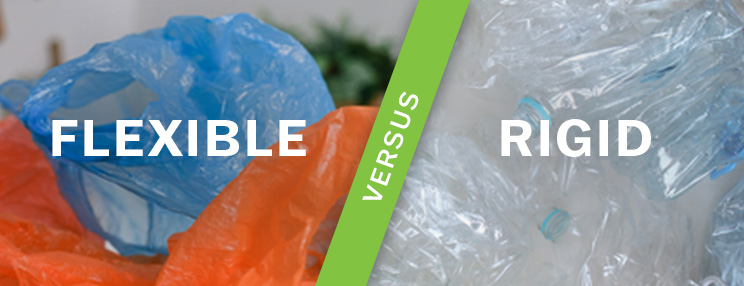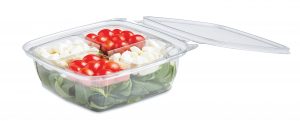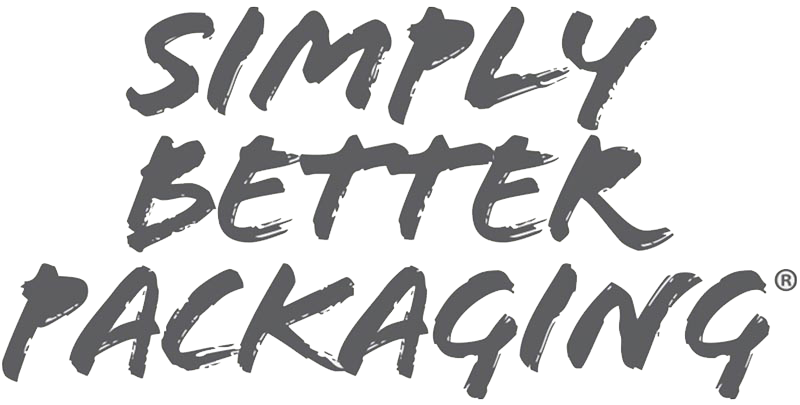Flexible vs. Rigid Plastic

Why aren’t all Plastics Recyclable and What is Best for the Environment?
By Catherine Haub
Plastics play a huge role in our everyday lives as they are in many of the objects we use today such as in our phones, our cars, and so much more. Life without plastic wouldn’t be the same as many of our great innovations we wouldn’t be able to use. There are many different types of plastic that can be found throughout stores and in different items that are used in everyday life including flimsy, flexible plastic, and stiff, rigid plastic. While it is clear that each plastic has different purposes, they each have to be disposed is different ways with some being recyclable and others having to be thrown in the trash. Some may seem recyclable when they aren’t while others are being thrown in the trash when they should be recycled. To know which plastics can be recycled instead of thrown away, there is a recycling labeled on many plastic items that indicates what should be done with the plastic [1]. It is important to know that a piece of plastic that has a recycling label doesn’t always mean it’s recyclable, or that it can be recycled through curbside recycling. Plastic that has the recycling label with a 1 (PET) or a 2 (HDPE) can normally be recycled through curbside recycling and turned back into what they originally were such as packaging, but the other plastics with different numbers may depend on the area or what happens with them when they are recycled [1]. For example, polypropylene (#5 recycling code) is recyclable, but the process is much more difficult and expensive than recycling PET, so most of it ends up being used for plastic lumber or park benches instead of being turned into packaging [2]. Some plastics can be taken to certain facilities to be recycled, but if there may not be any in the area, they’ll just end up in the trash.
It is important to look at the label before throwing plastic in the trashcan to make sure it is being discarded properly. It also may require more research to be done to see what kind of plastics can be recycled in the area as different areas have different rules for recycling. Though many flexible plastics have to be thrown away, people can look to find ways to reuse them, such as using shopping bags as garbage liners for small trash cans [3]. To know what you can and can’t recycle, check your local recycling website to find more information.
There are certain kinds of packaging that companies can avoid to make sure they’re being more sustainable. Companies should be aware of single use plastics or plastics that are hard to recycle, such as flexible packaging found in salad kits, and go more towards something that can be recycled easily. At Placon, we use a four-compartment insert that serves the same purpose as individual single use plastic pouches, but can be easily thrown into a recycling bin. This will lower waste going into landfills and our dependence on single use plastics.
Companies should also promote that they’re products that are easily recyclable as well so the customer can know what to do with the packaging after they’re done with it. This could lead to less plastic in landfills and being repurposed to create new plastic that can be used to make new products. Placon utilizes recycled plastic to make some of their packaging, so not only is the packaging recyclable, it isn’t completely new material which is better for the environment. We work directly with a recycling facility next door to collect, sort, and transform PET plastic thrown into recycling bins into new plastic, reducing our need to create new plastic.
Resources:
[1] 1, 2, 3, 4, 5, 6, 7: Plastics Recycling By the Numbers – Miller Recycling
[2] Which Plastic Can Be Recycled? | Plastics For Change
[3] The Ultimate 9 Quick Tips to Recycle More Plastics – Plastics Make It Possible
ABOUT PLACON
For 55 years, Placon has been a leading designer and manufacturer of custom and stock plastic packaging for the food, medical, and retail markets. Placon has manufacturing operations in Madison, WI; Elkhart, IN; Plymouth, MN; and West Springfield, MA, and currently ranked in Plastics News 2020 Thermoformers Ranking Top 20. Placon delivers packaging breakthroughs that inspire better engagement between people and products with industry leading innovation and award-winning packaging designs. For more information, visit www.placon.com.



 This is an example of one of our inserts which can be recycled. Each food item gets its own compartment, eliminating the need for it to be packaged in its own nonrecyclable pouch.
This is an example of one of our inserts which can be recycled. Each food item gets its own compartment, eliminating the need for it to be packaged in its own nonrecyclable pouch. 
